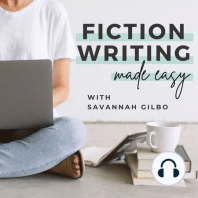13 min listen

#21: Progressive Complications: How to Write Better Conflict in Your Novel
#21: Progressive Complications: How to Write Better Conflict in Your Novel
ratings:
Length:
17 minutes
Released:
Aug 25, 2020
Format:
Podcast episode
Description
In today's episode, we're going to talk about writing better conflict in your novel using "progressive complications." Here's a preview of what's included:[01:20] Progressive complications are moments of conflict that get more and more challenging to deal with over time. These complications can be people, places, things, or events, and they can be negative or positive. [02:10] Stories exist because of conflict. If there was no conflict, you'd have nothing to write about.[02:30] Progressive complications can help you build tension in the reader and keep them on the edge of their seats.[03:05] Progressive complications can help you give the reader insight into who your character is AND how they change over time.[04:05] Each complication needs to relate to the POV character’s goal. If it doesn’t, you risk writing a story that doesn’t feel cohesive and you risk confusing the reader, too. [05:15] Each complication needs to be more difficult to deal with than the last complication. Otherwise, the tension in your story won’t build properly and you’ll likely lose the reader’s interest.[07:05] Each complication needs to require more effort from your character. This is the key way you’ll be able to show that your character is growing and changing into someone that’s capable of handling the upcoming global climax. [08:40] Each complication needs to be unique and "complex." This not only helps you write an interesting story, but it helps keep the story feeling fresh for the reader, too.[10:30] Each complication needs to build to a turning point when things change for better or for worse. This is what helps you create that sense of change within a scene or within your global story.[12:45] Key points and episode recap.Subscribe & Review in Apple PodcastsAre you subscribed to my podcast? If you’re not, I want to encourage you to do that today. I don’t want you to miss an episode! Especially because I’m adding a bunch of bonus episodes to the mix and if you’re not subscribed there’s a good chance you’ll miss out on those. So, click here to subscribe to the show in Apple Podcasts!If you're already a subscriber, and if you enjoy the show, I would be really grateful if you left a review over on Apple Podcasts, too. Those reviews help other writers find my podcast and they’re also super fun for me to go in and read. Just click here to review, select “Ratings and Reviews” and “Write a Review” and let me know what your favorite part of the show is. Thanks in advance!Links mentioned in this episode:Recommended Reading: STORY by Robert McKeeRecommended Reading: The Story Grid by Shawn CoyneP.S. Did you know that I have a Facebook group just for fiction writers? In this private group, we talk about all things writing, editing, and publishing fiction. It's free to join and you can request access here. Hope to see you there!Click here to register for the free masterclass > The 5 Little-Known Mistakes Most Fiction Writers Make (+ What to Do Instead). In this masterclass, we’re going to talk about the most common mistakes I see writers make so that you can avoid them and write your draft in the most efficient way possible.
Released:
Aug 25, 2020
Format:
Podcast episode
Titles in the series (100)
3 Ways to Create Narrative Drive in Your Story by Fiction Writing Made Easy